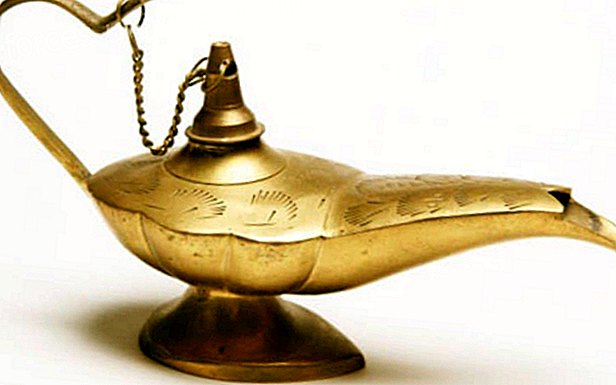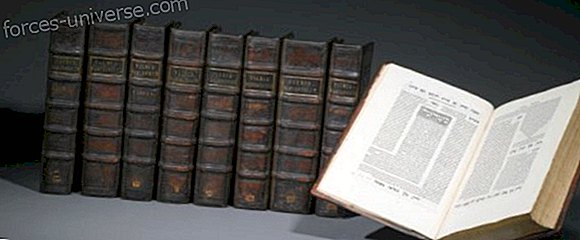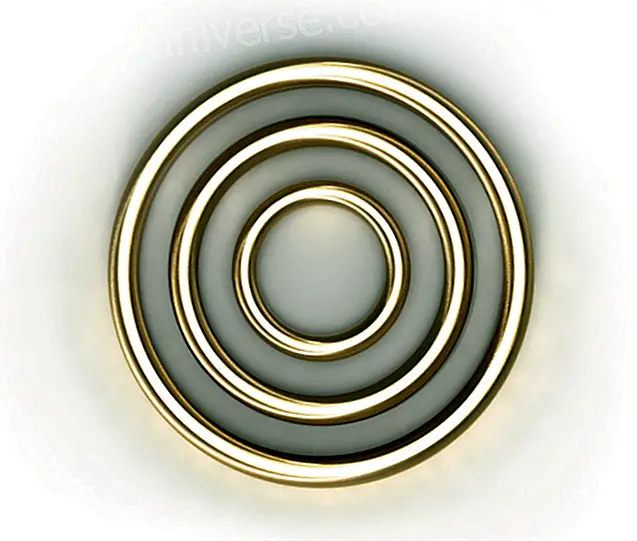 “What I am is my destiny, what I do is my free will”
“What I am is my destiny, what I do is my free will”
There is much talk among esoterists about liberation. The goal presented to the neophyte is liberation, freedom, emancipation; This, in short, is the keynote of life itself. The prevailing concept is the transition from the realm of the purely selfish and personal liberation to something broader and more important. This concept of liberation underlies the broad and modern use of the word "freedom, " but it has a wiser, more appropriate and deeper meaning. Freedom, in most minds, consists in freeing oneself from the rules imposed by any man, in having freedom to do what one desires, think as one determines and live as one prefers. This is as it should be, as long as one's desires, preferences, thoughts and desires were free from selfishness and dedicated to the good of the whole, which happens very rarely.
The thinking human being, when he has overcome the incitements of vice and is aware of having fulfilled an often painful duty, is in a state of calm of mind and contentment, which can very well be called happiness, and in which Virtue is your own reward.
That which tends only to happiness is inclination, but that which restricts the inclination to the condition of being first worthy of that happiness is reason and the freedom of the will is that the inclination can be limited and overcome by reason . While the discretion is individual, the will is universal.
It is therefore through the exercise of the will as a being manifests his conscience and that will that can be determined by motives represented by reason, is called free will.
So while freedom is what makes it easier for us to make our existence practical, liberation consists in freeing ourselves from the past, having freedom to progress in certain and predetermined lines (predetermined by the soul) and also to express the entire divinity that one He is capable as an individual, or a nation can manifest to the world.
Causality: Destiny and free will. (one)
According to Hinduism there is a law of causality according to which every action (karma) has one or several causes and produces one or several effects, a concept that can be associated with the idea of sin so popular in the Judeo-Christian culture from stories Mesopotamian mythological, and at the beginning of genetic and psychological inheritance, demonstrated by modern science. According to the law of karma, everything that affects us today, for better or worse, is the result of a chain of causes for which we have been more or less responsible and that began even before our birth in this life. In case of wanting to find terms that correspond to karma and dharma, expressions such as "failed acts, manifestation of instinctive will, unconscious actions, behavioral reflections, events and programmed circumstances" could be used, all this on the subject of karma; "Sense of responsibility, of duty, self awareness, respect for the laws of life, of nature, for others and any form of life", for everything that has to do with dharma.
Destiny is a direction, a path that thought takes, to conclude an understanding that was worked with effort and sacrifice. The direction is taken by the understanding of causation. Destiny is the continuation or rectification of cause and effect. Karma is synonymous with lack of understanding . Not knowing the origin of evils and psychic disturbances, these are attributed to destiny. Once understood and rectified, it will become dharma .
The relative free will that characterizes the self-consciousness of the human personality deals with:
1. Moral decision, superior wisdom.
2. Spiritual choice, discernment of truth.
3. Altruistic love, brotherhood service.
4. Cooperation with purpose, group loyalty.
5. Cosmic discernment, the understanding of universal meanings.
6. Dedication of personality, unconditional devotion to doing the will of God
7. Adoration, the sincere search for divine values and the love of the whole heart of the divine Giver of values.
The Moralists: Moral and Ethics . (2)
The last purpose of existence is the destiny of the human being and its study is called moral. In Antiquity, the moralist was given the name of a philosopher, and even today he is considered moralist who produces the impression of mastering himself by reason, who seeks to generate individual and social awareness.
Hedonism is the philosophical doctrine based on the search for pleasure and the suppression of pain as the objective or raison d'être of life. The epicureans were a branch of hedonism, which as a school of thought was dedicated to the search for happiness, taught that men could do something to improve their condition in the land.
The Stoics, meanwhile, believed that a controlling Destiny-Reason dominated all of nature. They taught that man's soul was divine and that he was imprisoned in an evil body of a physical nature. The soul of man achieved freedom by living in harmony with nature, with God; thus, virtue became its own reward. The epicureans said: virtue is being aware of following the maxims that lead to happiness. The Stoics considered that being aware of their own virtue was happiness.
Emanuel Kant finds an antinomy between epicorrhea and Stocia. For the former, prudence meant morality, for the latter only morality was true wisdom. Kant solves the conflict considering virtue as the only mode of existence of the rational being. The relationship is established between the morality of the intention (cause) with the well-being of the action (effect). Moral intention is necessarily linked to the awareness of a will determined by law.
From there begins to define ethics as the system of the ends of practical reason. Ethics gives laws for maximum actions.

Morality: virtues and vices . (3)
The desire has two capital expressions: attraction to possess or get in touch with an object that previously provided pleasure, repulsion to refuse or avoid contact with an object that previously inflicted pain. Since emotion is desire mixed with intellect, it also presents two divisions. Love is called the emotion of an attractive nature that pleasantly joins two objects and hate the emotion of a repulsive nature that painfully separates two objects.
In relationships between parents and children, love emotions are continually manifested by both parties. Parents show tenderness, compassion and protection towards their children, who respond with gratitude, fidelity and trust.
All manifestations of love are characterized by sympathy, self-denial and the desire to give, these are the essential factors in the modes of benevolence, solidarity and veneration, since all of them are subordinated to the attraction that unites and are of the true nature of love Hence, love is peculiar to the soul, because sympathy is to feel about others what one feels about oneself; self-denial is the recognition of the clamor of others as their own; and donation is a requirement of the spiritual life. Virtue is a permanent mode of love emotion directed towards a living being. Vice is the permanent mode of the emotion of hate, directed towards a living being. It is just that being in harmony with the supreme law, brings happiness. Unfair is that which being in opposition to the supreme law brings misery. When it is in harmony with the Will of God, ethics intermingles with religion.

The cycle of consciousness.
Desire, thought and action are the points of the always repeated cycle of consciousness. The propelling power of desire engenders thought; the leading power of thought guides action. Only from the cause-effect relationship, means-ends, is it possible to discern the avoidable actions from the inevitable ones.
Acting straight, is the one that is done exclusively out of respect for the law itself, respect being the only moral feeling. While the moral law as a fact of reason does not need a reason to justify it, it shows us that freedom is not only possible, but real in beings who recognize the law itself as obligatory. Authentic dignity is an autonomous morality, in it what counts is not what is done but how it is done, what counts is the intention to act well.
The individual action comes, in short, from the ideas and beliefs that are deposited in the mind. Such ideas and beliefs may not have a true correspondence with reality, hence the action will have a subjective foundation, in many cases.
The action is to carry out the work of thinking, but it has to be done with the best qualities of thinking, so as not to make mistakes or that the cause and the subsequent effect does not fit that cognitive quality.
The correct alignment between thought, work and action are the basis of conceptual dynamics to transmute desire into will. To the extent that the faculty of action or omission is linked to consciousness, it is called arbitrary, but if it is not attached to it, it is called desire. The power to desire determined by reason is called will.
The aspirations and desires become capacities, the thoughts repeated in tendencies, the intention to execute in actions, the painful experiences in conscience, the prudent experiences in wisdom.
The maxims come from the will, the laws come from the will. The coincidence of the maximum of the action with the law is its morality, the coincidence of an action with the law of duty is the legality.
Sometimes it acts according to conscience and customs but against the law, for example there are people whose conscience considers it acceptable to download music and videos from the internet and does so in a medium (the same cyberspace) where this is customary, although in some States this It is illegal. Similarly evading taxes is acceptable according to their conscience for some people, but it is known that this is illegal. Sometimes they act according to custom but against their own conscience and against the law, for example there are people who, after leaving a party, drive in a drunken state, despite knowing the dangers that this implies. There are also people who usually burn gunpowder at festivities aware of how dangerous it is and knowing the rules of their own city.
Adversities, pain, disease and poverty are great temptations to transgress one's duty. Therefore it seems that the well-being, vigor, health and prosperity in general that counteract the influence can be considered ends that are both duties, but in that case the end is not one's own happiness but the morality of the individual.
The Theory of Self Determination:
Life One, which manifests itself through matter, produces a third factor that is consciousness. This consciousness, the result of the union of the two poles, spirit and matter, constitutes the soul of all things; binds all objective substance or energy; it underlies in all forms, whether that of that unit of energy that we call atom or that of a man, a planet or a solar system. All lives, of which one life is formed, each in its sphere and way of being, are embedded in matter, so to speak, and assume forms through which its peculiar and specific state of consciousness can be understood and its stabilized vibration; so they can know themselves as stocks. Again, life then becomes a stabilized and conscious entity through the solar system, therefore being essentially the total sum of energies of all states of consciousness and of all forms of existence. The homogeneous becomes heterogeneous, and yet it remains a unit; the one manifests in diversity, and yet is immutable; the central unit is known in time and space, as composed and differentiated, and yet when there is no time and space (since they are only states of consciousness) only unity will remain and only the spirit will persist, in addition to an increased vibratory action and the ability to intensify the light when the manifestation cycle returns.
Within the vibratory pulsation of Life one in manifestation, all lower lives repeat the process of being Gods, angels, men and myriads of lives that are expressed through the forms of the kingdoms of nature and the activities of the evolutionary process. Everything becomes self-centered and self-determined.

Freedom and Liberation
The whole life of experience, from the sphere of birth to the highest limits of spiritual possibility, are described by four words, applicable to the different stages of evolution, and are: Instinct, Duty, Dharma, Obligation; Understanding their differences will bring enlightenment and, consequently, correct action.
1. The sphere of instinct . It refers to compliance governed by the influence of simple animal instinct, of the obligations that any responsibility brings, even if it has been assumed without true understanding. An example of this is the instinctive care of the mother for her progeny, or the male and female relationship. We do not need to go into detail about this, because it is well known and understood, at least by those who have left the sphere of elementary instinctual obligations. They are not given any particular call, but this instinctive world of give and take is timely replaced by a higher sphere of responsibility.
2. The sphere of duty . The call that arises from this sphere comes from a more strictly human realm of consciousness and not so predominantly animal, as is the instinctive realm. He drags all kinds of human beings into his field of activity and demands from them - life after life - the strict fulfillment of duty. The "fulfillment of one's own duty" from which we get little praise and little appreciation, is the first step towards the development of that divine principle that we call a sense of responsibility, and indicates - when it has developed - an increased and constant control exercised by the soul . The fulfillment of duty, the sense of responsibility and the desire to serve, are three aspects of the same thing: discipleship in its embryonic stage. This, perhaps, is hard words for those who are involved in the seemingly hopeless task of fulfilling duty; they find it painful to understand that such duty, which seems to chain them to the monotonous, seemingly insignificant and ungrateful duties of daily life, is a scientific process that takes them to the higher stages of the experience and eventually to the Ashrama of the Master.
3.The sphere of dharma . Result of the two previous stages, where the disciple recognizes, for the first time clearly, the part that corresponds to him in the whole process of world events and his inevitable participation in the development of the world.
These three aspects of vital activity are in the life of the disciple the embryonic expression of the three divine aspects:
to. Instinctive life smart application.
b. I owe responsible love.
C. Dharma will, expressed through the Plan.
4.The sphere of obligation . When the initiate has learned the nature of the other three spheres of correct action and - through the activity of these spheres - has developed the divine aspects, he moves on to the sphere of obligation.
During the history of the last two thousand years there have been four great symbolic events, which sequentially have presented (to those who have eyes to see, ears to hear and mind to interpret) the issue of liberation, not simply that of freedom .
1. The life of the Christ . He, for the first time, presented the idea of the sacrifice of the entity, consciously and deliberately offered to serve the whole. There have been other Saviors of the World, but the issues involved were not expressed so clearly, because the mind of man was not prepared to capture the implications. Service is the key release note. Christ was the ideal Server.
2. The signing of the Magna Carta . This document was signed in Runnymede, during the reign of King John, on June 15, 1215. AD The idea of the release of authority was presented, emphasizing personal freedom and the rights of the individual. The growth and development of this basic idea, the mental concept and the formulated perception, can be classified into four phases or chapters:
to. The signing of the Magna Carta, emphasizing personal freedom.
b. The Declaration of Independence and the Bill of Rights, which determined the national policy of North America.
C. The foundation of the French Republic with its emphasis on human freedom.
d. The Atlantic Charter, joint declaration signed on August 14, 1941 and the Four Freedoms, bringing the whole issue into the international arena and guaranteeing men and women around the world the freedom and liberation to develop the divine reality itself same.
The ideal has gradually become clear in such a way that today the masses of men everywhere know the basic essential things for happiness.
3.Emancipation of slaves . The spiritual idea of human freedom, which became a recognized ideal, became an imperative desire, taking place a great symbolic event - slaves were liberated - which, like all things that human beings do, is imperfect
4. The liberation of humanity by the united nations . It was up to the United Nations to protect the energy released from the atom (in 1945), so that it was not misused or prostituted for selfish purposes and purely material purposes.
The energy of the atom is "saving force" that contains in itself the power to rebuild, rehabilitate and restore. Their correct employment can abolish homelessness and bring civilized welfare (and not useless luxury) to those who inhabit the planet; its expression in the forms of the right life, if they are motivated by right human relations, will produce beauty, heat, color and the elimination of the existing disease, the abandonment, by the human race, of all the activities that involve living or working underground., which will end all human slavery, any need to work or fight for possessions and things, and will make possible a condition of life that will give man freedom to achieve the superior goals of the spirit. It will also avoid the need to dedicate life solely to meet the primary needs or for the rich or privileged to have too much, while others have nothing.
There are many types of atoms that constitute the "substance of the world"; everyone can release their own kind of force; This is one of the secrets that the new era will reveal in its time, but a good and solid beginning has been made. Liberation is the tonic of the new era, just as it has always been the tonic of the spiritually oriented aspirant. This liberation has begun by the liberation of an aspect of matter and the liberation of some of the forces of the soul, within the atom. For the same matter it has been a great and powerful initiation, similar to those initiations that liberate the souls of men. What will happen when the energy of the soul is released?
Only when psychologists study the triple essential nature of the soul will the mystery of consciousness and the nature of the three universal feelings be revealed, their ramification in emotions and the consequent effective radiation from the brain will become a factor of daily life. Those feelings are consciousness, freedom and love. Consciousness was distorted in suffering which led to antagonism, freedom was distorted in fear which led to the struggle for survival, love was distorted in pleasure, which generated causation.
This has to do with the definitive development of the psyche according to the law, the scientific expansion of consciousness, the first initiation, will no longer be esoteric but exoteric. Humans everywhere will have freed themselves, reaching a way of life that will provide them with the opportunity and time to follow spiritual goals, realize a fuller cultural life and reach a broader mental perspective.
EDITOR'S NOTES
1. It was very revealing for me to find similarities between Emanuel Kant's approaches with Vedanta philosophy.
2. It is possible to distinguish between the moralists Buddha and Zoroaster who advise norms of life and the philosophers of ethics, Aristotle and Kant who take morals and reflect on it. The Saxon world follows Aristotle and the Latin Kant.
3. The science of emotions and the foundation of a rational and understandable system of ethics, is due to the Indian author Bhagavan Das, the first to order that confusing region of the domain of consciousness.






